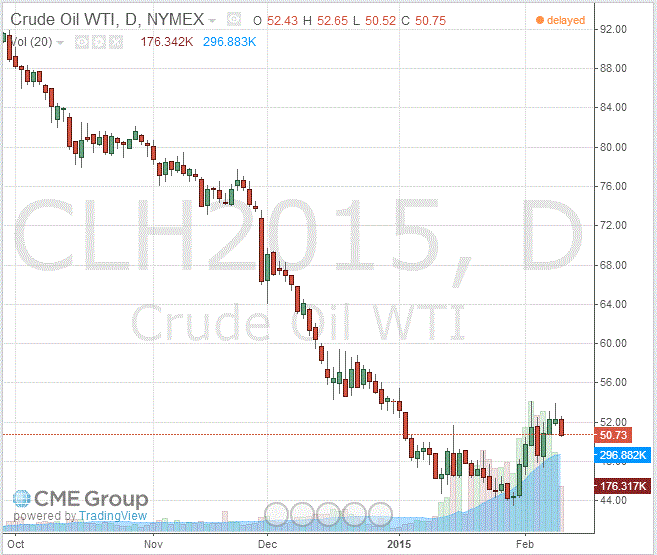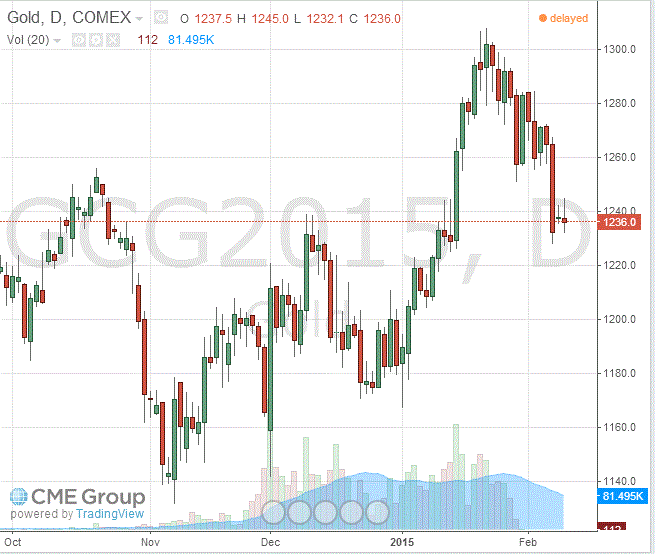Noticias del mercado
-
17:40
Oil: a review of the market situation
Oil futures fell modestly today, breaking a three-day rally at the same time, which was caused by reports by the International Energy Agency (IEA), as well as concerns about slowing growth in China.
Today, the IEA said that oil production in the fields with hard to recover reserves in the United States by the end of 2020 will increase to 5.2 million barrels per day (b / d) from last year's level of 3.6 million. The IEA expects to maintain a surplus of oil in the world to the middle of this year, when its reserves in industrialized countries can come close to the historical record of 2.83 billion barrels of that recorded in August 1998. The IEA also noted that the oil market goes lower point, and raw materials will start to go up, though restrained pace. According to experts of the agency, in the second half of the excess supply will start to decline, and the market will gradually recover against the backdrop of slowing growth in oil production in the world.
It is worth emphasizing that the forecast by the IEA is markedly different from yesterday's report of OPEC, which experts said that the demand for oil cartel will grow this year against the background of reduction in the rate of production growth in the US, which proves the correctness of the chosen company policy to reduce prices to suppress competition and recovery demand for oil. According to the monthly report of the OPEC cartel's oil demand in 2015 will grow by about 110,000 barrels per day to 29.2 million barrels a day. Previously, the forecast was adjusted in the direction of growth in demand for 400,000 barrels per day.
Also, market participants analyze the report on China, which showed that the consumer price index in January rose by 0.8% compared to the same period of the previous year against growth of 1.5% in December. Analysts had expected an increase of 1.1%. Consumer price inflation in China fell to a 5-year low in January, reinforcing fears of deflation, while the growth of China's economy slows. Low inflation gives the central bank more room for further easing of monetary policy to stimulate the sluggish economy.
The course of trade is also affected by expectations of tomorrow's publication of data on oil reserves. "Progress report on a significant increase in US oil inventories can stop the growth of prices", - the bank's analysts wrote ANZ. It is expected that the results of last week's oil reserves rose by 3.8 million., While setting a new record high.
March futures price for US light crude oil WTI (Light Sweet Crude Oil) dropped to 50.73 dollars per barrel on the New York Mercantile Exchange.
March futures price for North Sea Brent crude oil mix fell to $ 0.72 to $ 57.07 a barrel on the London Stock Exchange ICE Futures Europe.
-
17:20
Gold: a review of the market situation
Gold prices declined moderately today, approaching at the same time to a minimum on Friday. The growth of the precious metal was limited increase US bond yields, and the fall - the situation in Greece and Ukraine.
Experts note that the probability of a Greek exit from the eurozone has improved, as Prime Minister Alexis Tsipras has taken a tough stance against foreign debt, saying that Greece will not extend the loan program for the current environment. But European Commission President Jean-Claude Juncker said that the euro zone will not meet these requirements.
"Given the lingering concerns over Greece, as well as the crisis in Ukraine, gold should find support in the near future to hold above $ 1,225," - said a trader at MKS Group Jason Cherizola.
The rise in price of gold is also constrained amid growing opportunities early rate hike by the Federal Reserve after a positive employment report in the United States, released last week, has forced investors to reconsider the expectations of the first rate rise in June.
"With the strengthening of the US dollar should not expect a significant increase in the price of gold in dollar terms, but in terms of the euro is likely we will see a rise in price due to increased purchases of coins and bullion," - said Carsten Fritsch analyst at Commerzbank.
Had little impact as US data. It is learned that in December wholesale inventories rose by only 0.1%, while sales declined by 0.4%. Inventories of durable goods rose 0.8%, stocks of cars gained 0.3%, while stocks non-durable goods rose by 0.7%. Sales of durable goods increased 0.2% (cars + 0.4%), while sales of non-durable goods fell by 1.7%. The ratio of inventories to sales was 1.22 versus 1.21 in November and 1.16 a year ago.
As for the situation in the physical market, the margins in China have not changed, but remained in the range of $ 2.50-3.50. This indicates that increasing the demand for lower levels.
March futures price of gold on the COMEX today fell to 1236.00 dollars per ounce.
-
12:20
Oil: Prices decline as Chinese inflation data and IEA report weighs
Oil prices declined in today's trading after the International Energy Agency stated that prices are likely to fall as stockpiles will increase. Stockpiles help by OPEC-members will reach an all-time high in the middle of 2015. China's inflation at a five-year low fuelled concerns about the world's second largest oil consumer's economic outlook. Brent Crude lost -0.60%, currently trading at USD57.99 a barrel. On January 13th Crude hit a low at USD45.19 and began to rise on reports on declining rig numbers in the U.S. and capital expenditure cuts. Crude had the biggest 2-week gain in 17 years. West Texas Intermediate declined by -1.23% currently quoted at USD52.21.
Worldwide supply still exceeds demand in a period of low global economic growth and the OPEC refusing to cut output rates to stabilize prices. Smaller OPEC members want to cut production but the organisation, responsible for 40% of worldwide production focuses on its fight for market share. Rising U.S. stockpiles are contributing to a global glut that drove prices almost 50 percent lower last year. The U.S., Brazil, Russia and the OPEC are producing at record levels.
-
12:00
Gold prices almost flat despite Greek concerns and Lunar New Year
Gold is trading almost flat today despite concerns over Greece, weak equity markets and physical demand due to the upcoming Lunar New Year holidays in China. Yesterday the precious metal was sought after as safe-haven asset on renewed concerns over the developments in Greece after slumping on Friday on U.S. jobs data. Over the weekend Greek Prime Minister Alexis Tsirpas ruled out any extension of the international bailout and reaffirmed that he will stick to his plan to roll back austerity measures. On late Friday Standard and Poor's downgraded Greece from B- to B, only one notch higher than "default" and kept the outlook for Greece negative. S&P warned that time is running out for Greece to reach an agreement. Greek Defence Minister said that if Greece will get no help from the European Union it can look somewhere else. European Commission President Jean-Claude Juncker warned Greece that the Eurozone is not going to accept Tsirpas plans.
The precious metal is currently quoted at USD1,238.10, +0,02% a troy ounce. On Thursday the 22nd of January gold reached a five-month high at USD1,307.40.
-
10:20
Press Review: Brent crude rally ends as China inflation hits five-year low
BLOOMBERG
Low-Inflation Inertia Adds Risk of Misfire in Fed Rate-Rise Plan
(Bloomberg) -- Prices go up and prices go down. At the Federal Reserve, a bigger worry now is that they stay the same.
U.S. central bankers are betting the economy is near an inflection point where demand is strong enough to create more jobs, eventually nudging both wages and prices higher. A report Friday showed payrolls in the past three months rose the most in 17 years while wages showed the biggest gains since 2008, reinforcing views the threshold is close.
That should help meet Fed Chair Janet Yellen's requirement for officials to be "reasonably confident" inflation is heading higher before raising interest rates this year.
The nagging problem that's making them "nervous," says St. Louis Fed President James Bullard: the longer inflation stays below the Fed's 2 percent target -- as it has for 32 months -- the higher the risk that it remains stuck in a low range.
REUTERS
Brent crude rally ends as China inflation hits five-year low(Reuters) - Brent fell below $58 a barrel on Tuesday after China's consumer inflation came in at a five-year low for January, raising worries about oil demand in the world's second-largest economy.
The International Energy Agency (IEA) also said the United States will remain the world's top source of oil supply growth up to 2020, defying expectations of a dramatic slowdown in shale output and keeping fears of a continuing glut at the forefront.
Brent crude slipped 64 cents to $57.70 by 0730 GMT (2:30 a.m. EST), ending a three-day rally. The benchmark gained more than 9 percent last week, its biggest weekly rise since February 2011.
Source: http://www.reuters.com/article/2015/02/10/us-markets-oil-idUSKBN0LE06820150210
REUTERS
UK's Osborne says danger of 'very bad outcome' on Greece increasing: Bloomberg(Reuters) - British finance minister George Osborne said the danger of a miscalculation leading to a "very bad outcome" between Greece and the euro area is increasing, Bloomberg reported.
"It's clear that the risks to the world economy, the risk to the British economy of this standoff between the euro zone and Greece, is growing each day," Osborne said in an interview with Bloomberg Television in Istanbul late on Monday.
"The risks of a miscalculation or a misstep leading to a very bad outcome are growing as well," Osborne said.
Source: http://www.reuters.com/article/2015/02/10/us-eurozone-greece-britain-idUSKBN0LE0GQ20150210
-
00:32
Commodities. Daily history for Feb 9’2015:
(raw materials / closing price /% change)
Light Crude 52.86 +2.26%
Gold 1,241.50 +0.56%
-


